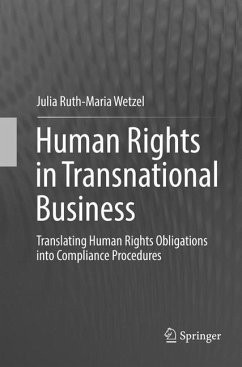This book investigates how human rights law can be applied to corporate entities. To date there have been insufficient international legal mechanisms to bring corporations to justice for their misconduct abroad. The book argues that rather than trying to solve the problem locally, an international approach to corporate human rights compliance needs to be sought to prevent future corporate human rights abuses.
Implementing effective and enforceable human rights compliance policies at corporate level allows businesses to prevent negative human rights impacts such as loss of revenue, high litigation costs and damage to reputation.
By considering human rights to be an inherent part of their business strategy, corporations will be well equipped to meet national and regional business and human rights standards, which will inevitably be implemented in the next few years.
This approach, in turn, also furthers the fundamental aim of international human rights law.
Implementing effective and enforceable human rights compliance policies at corporate level allows businesses to prevent negative human rights impacts such as loss of revenue, high litigation costs and damage to reputation.
By considering human rights to be an inherent part of their business strategy, corporations will be well equipped to meet national and regional business and human rights standards, which will inevitably be implemented in the next few years.
This approach, in turn, also furthers the fundamental aim of international human rights law.
"This book provides an insightful overview of the field of business and human rights, as evidenced by many practical examples of the relevance of human rights in business operations. ... Human Rights in Transnational Business can be used as a first step for further research or an incentive for a debate regarding the need for a new legal human rights framework." (Ondrej Svoboda, Australian Journal of Human Rights, Vol. 24 (1), March, 2018)








